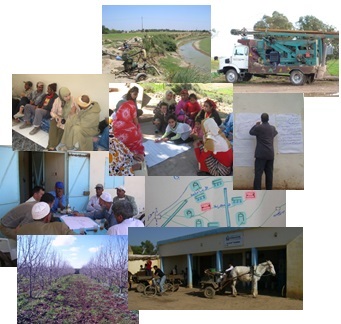Kawtar Lebdaoui, Zhour Bouzidi, Nicolas Faysse
https://doi.org/10.60569/hsoua-a8
Hors-série ouvrières agricoles, octobre 2025
Résumé
Au Maroc, malgré la diversité des opportunités de travail en ville, de nombreuses femmes résidant les quartiers périphériques optent pour le travail agricole reconnu comme professionnellement dur et socialement mal vu. Cet article a pour objectif d’analyser : i) les raisons qui amènent des femmes de ces quartiers périphériques à privilégier l’emploi agricole, ii) leurs perceptions et expériences vécues d’humiliation et de honte, et iii) leurs stratégies face à l’humiliation et la honte ressenties. L’étude s’est fondée sur douze entretiens semi-structurés et trois récits de vie d’ouvrières et ex-ouvrières agricoles de deux quartiers périphériques de Meknès. Ces femmes ont toutes exercé plusieurs emplois précaires disponibles en ville. Elles ont choisi, à un moment, l’emploi agricole, en prenant en compte des critères de revenu, d’organisation du travail, mais aussi de possible sentiments d’humiliation et de honte. Si toutes ont vécu des expériences d’humiliation liée à l’emploi agricole, la majorité des femmes interrogées revendiquent que l’emploi agricole, tout comme les autres travaux informels et précaires en ville, n’est pas en soi honteux. Ces femmes mobilisent différentes stratégies, allant de l’indifférence à la mobilisation collective, pour mettre à distance voir gérer proactivement cette humiliation et honte. Rendre l’emploi agricole plus vivable pour ces femmes pourrait passer à la fois par de meilleures conditions de travail mais aussi par une déstigmatisation et une valorisation de cet emploi.
Mots clés : choix contraint, honte, humiliation, Meknès, quartiers périphériques, ouvrières agricoles, précarité
اختيار عمل ينظر إليه بازدراء دون أن يكون بالضرورة أدنى من غيره: العمل الزراعي لدى ساكنات الأحياء الهامشية بمدينة مكناس (المغرب)
ملخص
في المغرب، ورغم تنوع فرص العمل في المدينة، تختار العديد من النساء القاطنات في الأحياء الهامشية العمل الزراعي، المعروف بكونه مهنة شاقة ومحتقرة اجتماعياً. يهدف هذا المقال إلى تحليل: (1) الأسباب التي تدفع نساء هذه الأحياء إلى تفضيل العمل الزراعي، (2) تصوراتهن وتجاربهن المعيشية المرتبطة بالإهانة والخجل، و(3) استراتيجياتهن في مواجهة مشاعر الإهانة والخجل. اعتمدت الدراسة على اثني عشرة مقابلة نصف موجهة وثلاث سير حياة ذاتية لنساء يعملن أو سبق أن عملن في مجال الزراعة من حيَّيْن هامشيين في مكناس. جميع هؤلاء النساء سبق لهن أن مارسن وظائف هشة متعددة متاحة في المدينة، ثم اخترن في فترة معينة العمل الزراعي بناءً على معايير الدخل، وتنظيم العمل، بل وحتى احتمال التعرض لمشاعر الإهانة والخجل. ورغم أن جميعهن عشن تجارب مرتبطة بالإهانة نتيجة العمل الزراعي، فإن أغلب النساء المستجوبات يؤكدن أن العمل الزراعي، شأنه شأن باقي الأعمال غير الرسمية والهشة في المدينة، ليس عيباً في حد ذاته. وتستعين هؤلاء النساء باستراتيجيات مختلفة، تتراوح بين اللامبالاة والتعبئة الجماعية، من أجل التخفيف من حدة الإهانة أو تدبيرها بشكل استباقي. يمكن للعمل الزراعي النسائي أن يصير أكثر قابلية للعيش من خلال جهد مزدوج يشمل تحسين ظروف العمل، فضلا عن رفع الوصم الاجتماعي الذي يطبعه وإعادة الاعتبار لهذه المهنة.
الكلمات المفتاحية: اختيار مُقيد، خجل، إهانة، أحياء هامشية، عاملات زراعيات، هشاشة, مكناس
The choice of a poorly regarded job, but not necessarily worse than others: agricultural work by women from the peripheral neighborhoods of Meknes (Morocco)
Abstract
In Morocco, despite the diversity of employment opportunities in urban areas, many women living in peripheral neighborhoods choose agricultural work, which is known to be both physically demanding and socially stigmatized. This article aims to analyze: (i) the reasons why women from these peripheral neighborhoods prioritize agricultural employment; (ii) their perceptions and lived experiences of humiliation and shame; and (iii) their strategies for coping with such humiliation and shame. The study is based on twelve semi-structured interviews and three life stories of current and former female agricultural workers from two peripheral neighborhoods of Meknes. All these women had previously worked in several precarious jobs available in the city. At a certain point, they opted for agricultural employment, taking into account criteria related to income, work organization, as well as the potential feelings of humiliation and shame. While all reported experiencing humiliation related to agricultural work, the majority of the interviewees asserted that agricultural employment, like other informal and precarious urban jobs, is not inherently shameful. These women mobilize a variety of strategies—ranging from indifference to collective action—to distance themselves from, or proactively manage, experiences of humiliation and shame. Making agricultural work more bearable for these women requires not only improving working conditions but also reducing stigma and recognizing the value of this form of employment.
Keywords: constrained choice, shame, humiliation, Meknes, peripheral neighborhoods, female agricultural workers, precariousness

